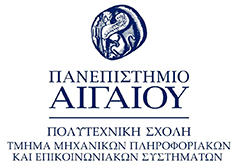Εκπαίδευση - Σπουδές
- Πτυχίο (BSc, 240 ECTS) στην Επιστήμη Υπολογιστών από το Πανεπιστήμιο Πειραιά, Τμήμα Ψηφιακών Συστημάτων – Σχολή Τεχνολογιών Πληροφορικής και Επικοινωνιών (Κατεύθυνση: Συστήματα Επικοινωνιών και Δικτύων).
- Μεταπτυχιακό Δίπλωμα (MSc, 120 ECTS) στην Ασφάλεια Πληροφοριών και Δικτύων από το Πανεπιστήμιο της Στοκχόλμης (Stockholm University), Σουηδία – Τμήμα Επιστημών Υπολογιστών και Συστημάτων.
- Εξάμηνο ανταλλαγής στο Πανεπιστήμιο Katholieke Universiteit Leuven (KULEUVEN), τμήμα Ηλεκτρολόγων Μηχανικών.
- Υποψήφια διδάκτωρ στη Σημασιολογική Διαλειτουργικότητα κι Ανοιχτά - Συνδεδεμένα Δεδομένα στο Πανεπιστήμιο Αιγαίου – Τμήμα Μηχανικών Πληροφοριακών και Επικοινωνιακών Συστημάτων.
Ερευνητικά Ενδιαφέροντα
- Σημασιολογική Διαλειτουργικότητα
- Μηχανική Γραφημάτων Γνώσης
- Μηχανική Οντολογιών
- Ανοιχτά και Συνδεδεμένα Δεδομένα
- Ασφάλεια Πληροφορίας
- Πολιτική και Διαχείριση Δεδομένων
- Τεχνητή Νοημοσύνη και Ηθική Αλγορίθμων
Διδασκαλία
Επιτροπές - Διοικητικό έργο
IDPC - International Data Policy Committee
CODATA - Committee on Data of the International Science Council
Δημοσιεύσεις σε Διεθνή Περιοδικά (Journals)
Copyright Notice: This material is presented to ensure timely dissemination of scholarly and technical work. Copyright and all rights therein are retained by authors or by other copyright holders. All persons copying this information are expected to adhere to the terms and constraints invoked by each author's copyright. In most cases, these works may not be reposted or mass reproduced without the explicit permission of the copyright holder.
Abstract
Value creation and innovation by a range of stakeholders, including citizens, analysts, journalists, non-profit entities, etc. are the hallmarks of Open Government Data (OGD) initiatives. At the same time, availability and interoperability of datasets are determined as two of the most important factors for value creation. In parallel, the United Nations’ Sustainable Development Goals (SDGs) are meant to be realized to attain quality of life through the development of initiatives based on the value creation and innovation provided by the
afore-identified stakeholders. Thus, the information provided from the public sector OGD regarding SDGs would help the monitoring of current and the identification of next actions and initiatives. The examination of SDG datasets availability and the assessment of their
interoperability would provide valuable insights regarding the extent to which the data are of high-value. In that vein, the availability and the interoperability dimensions of the OGD provisioned via the national OGD portals of the six Gulf Cooperation Council (GCC) constituents; viz., Bahrain, Qatar, Oman, Kuwait, United Arab Emirates (UAE) and Saudi Arabia, are studied based on a semi-automatic methodological approach. In this light, the present study seeks to answer the following research question: “To what extent are the national OGD portals of the GCC region catering for the interoperability dimensions, more specifically, the semantic interoperability, to facilitate value creation and innovation?” To drive home the arguments, semantic interoperability dimensions were investigated via the cosine similarity calculations in Python to understand the extent to which the availability of OGD via the national OGD portals facilitates their interoperability. Findings show that the value creation and innovation initiatives to realize the SDGs’ attainment is dependent upon both the availability and the extent of interoperability for all SDGs. GCC countries present different levels of both factors. This is suggestive of the mismatch of the OGD provision and their attributes which results in low interoperability. Findings from the study are indicators that the GCC countries should develop different strategies regarding the availability and the interoperability of SDG-related OGD in order to stimulate innovation and value creation.
Επιστημονικά Συνέδρια (Conferences)
Copyright Notice: This material is presented to ensure timely dissemination of scholarly and technical work. Copyright and all rights therein are retained by authors or by other copyright holders. All persons copying this information are expected to adhere to the terms and constraints invoked by each author's copyright. In most cases, these works may not be reposted or mass reproduced without the explicit permission of the copyright holder.
Abstract
Open government data has been in the spotlight for several years, emphasising the need for publicly available datasets to foster societal innovation and enable da-ta-driven decision-making. However, it is not sufficient for data to be available through an open data portal or repository to be usable by end users and for them to fully unveil its potential; it also needs to be accessible and intelligible. Target-ing this aspect, this study builds on the synergy of open government data and emerging technologies, such as Large Language Models (LLMs) to demonstrate that technologically enabled open data portals can have enormous possibilities for end-users to understand an available dataset efficiently, and in an interactive man-ner. This implementation is built on the LLMs Retrieval Augmented Generation (RAG) functionality which fetches datasets after a user’s choice from the Greek Open Data Portal, allowing the user to ask questions about this dataset using nat-ural language. The Greek open data portal provides access to datasets from dif-ferent domains through the Application Programming Interfaces (APIs) which makes it easier to bridge the gap between complex data and non-technical users who want to use it. This work explores the implementation potential of such a pipeline in a real-world application using the Greek Open Data portal as data source, and by utilising a conversational smart agent to interact with the open da-tasets available through the portal, it brings forward new capabilities in data-user interaction and efficient data exploration. Apart from the implementation, this study explores the pitfalls and shortcomings of such an endeavour (conversation-al agents) which requires real-time calculations and deterministic responses.
Abstract
As a novel Artificial Intelligence (AI) application, ChatGPT holds
pertinence not only for the academic, medicine, law, computing or other sectors, but also for the public sector-case in point being the Open Government Data (OGD) initiative. However, though there has been some limited (as this topic is quite new) research concerning the capabilities ChatGPT in these sectors, there has been no research about the capabilities it can provide to government concerning its wide range of functions and activities. This paper contributes to filling this gap by investigating the capabilities that the ChatGPT can provide concerning one of most recently initiated and novel, and at the same
time most promising, activities of government that aims to fuel the emerging data economy and society: the opening of large amounts of government data; furthermore, we investigate the public values that can be promoted through the use of ChatGPT in the area of OGD by both the data publishers as well as their users. At the same time, we investigate the issues that the use of ChatGPT in the area of OGD can pose, which can reduce the capabilities identified as aforesaid
as well as the benefits and public values that can be generated from them. For these purposes interviews with 12 experts have been conducted and their responses have been analyzed. Finally, based on our findings we have developed a research agenda concerning the exploitation of ChatGPT application in the OGD domain.
Βιβλία
Copyright Notice: This material is presented to ensure timely dissemination of scholarly and technical work. Copyright and all rights therein are retained by authors or by other copyright holders. All persons copying this information are expected to adhere to the terms and constraints invoked by each author's copyright. In most cases, these works may not be reposted or mass reproduced without the explicit permission of the copyright holder.
Κεφάλαια σε Βιβλία
Copyright Notice: This material is presented to ensure timely dissemination of scholarly and technical work. Copyright and all rights therein are retained by authors or by other copyright holders. All persons copying this information are expected to adhere to the terms and constraints invoked by each author's copyright. In most cases, these works may not be reposted or mass reproduced without the explicit permission of the copyright holder.
Επιμέλεια Πρακτικών Διεθνών Συνεδρίων
Copyright Notice: This material is presented to ensure timely dissemination of scholarly and technical work. Copyright and all rights therein are retained by authors or by other copyright holders. All persons copying this information are expected to adhere to the terms and constraints invoked by each author's copyright. In most cases, these works may not be reposted or mass reproduced without the explicit permission of the copyright holder.





 Download
Download